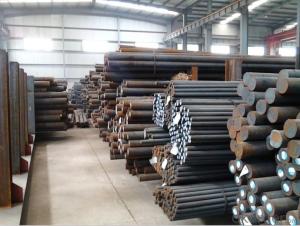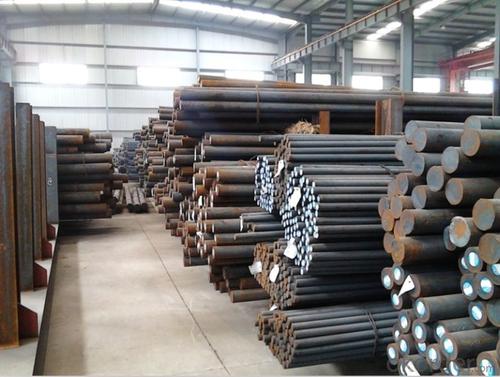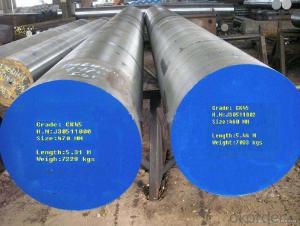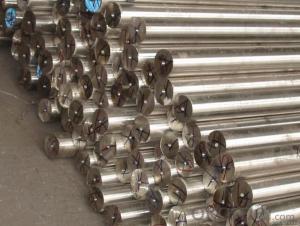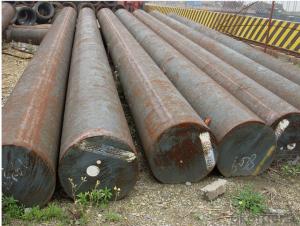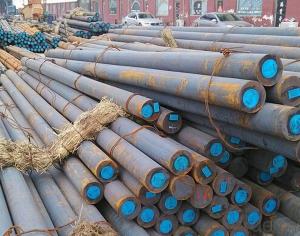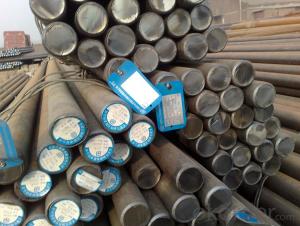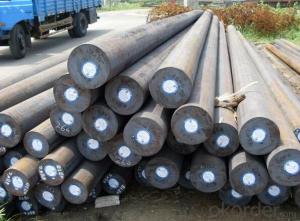Special Steel 1.2343 Round Forged Tool Steel
- Loading Port:
- China main port
- Payment Terms:
- TT OR LC
- Min Order Qty:
- 30 m.t.
- Supply Capability:
- 10000 m.t./month
OKorder Service Pledge
OKorder Financial Service
You Might Also Like
Specification
Specifications
1.2343 steel bars
1.Diameter:10mm~600mm,
2.Delivery Conditon:annealed, black/turned surface
3.Short Delivery Time
Product information
| 1.2343 steel round bars | |||||||||
| Chemical Composition(%) | |||||||||
| C | Si | Mn | P | S | Cr | Mo | V | W | Other |
| 0.33-0.43 | 0.80-1.20 | 0.20-0.50 | ≤0.030 | ≤0.030 | 4.75-5.50 | 1.10-1.60 | 0.30-0.60 | --- | --- |
| Specialty | |||||||||
| Harden and air cooling steel, 600`C work, high rigidity, high endurance, anti-heating, anti-cracking, electric sediment and middle-melting steel, compact structure, refined in electric cooker, quality of steel is pure, owned good character of equal direction. | |||||||||
| Use | |||||||||
| 1. Extrusion mold of aluminum and magnesium, die-casting mold, especially adapt to the mold in large and complicated form. | |||||||||
| 2. Extrusion mold of copper alloy, die-casting mold | |||||||||
| 3. Hot pressing machine mold | |||||||||
| Heat Treatment | |||||||||
1Annealing after forging:technology heat to 860-890°c,keep temperature 2-4H,furnace cold below 500°c,out and air cool,hardness ≤229HBS 2.stress relieving annealing technology :heat to 730-760°c,keep 3-4H,furnace cold and air cool. | |||||||||
| Melting Process | |||||||||
| 1. EAF: Electric Furnace+LF+VD(Optional) | |||||||||
| 2. ESR: Electric Furnace+LF+VD+Eleroslag Remelted(Optional) | |||||||||
| UT Class | |||||||||
| According to Standard of SEP 1921/84,100% Volume, Level C/c, D/d or E/e | |||||||||
| Tolerance on Quantity | |||||||||
| +/-10% Per Size | |||||||||
Product show
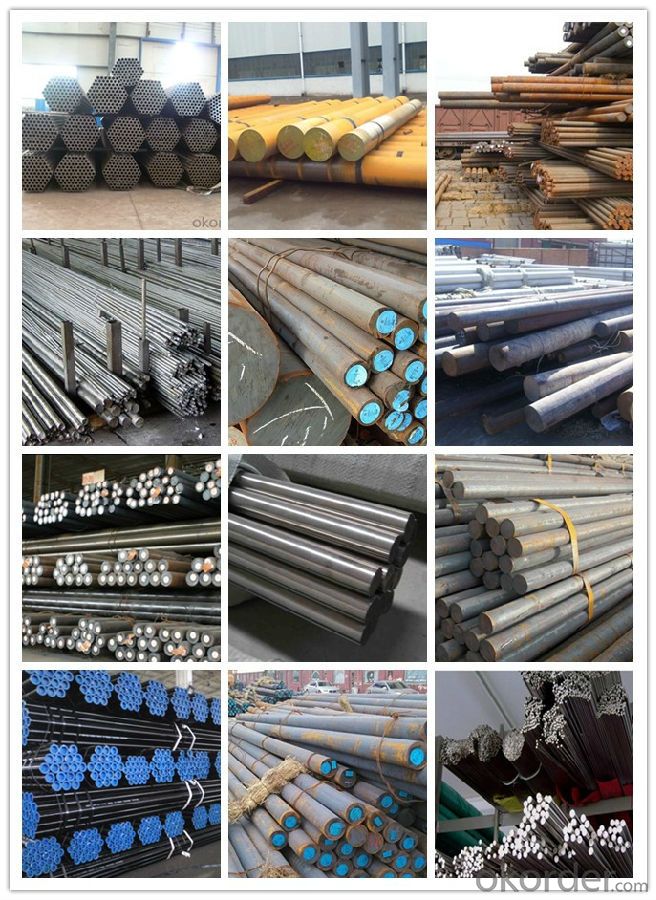
Workshop show
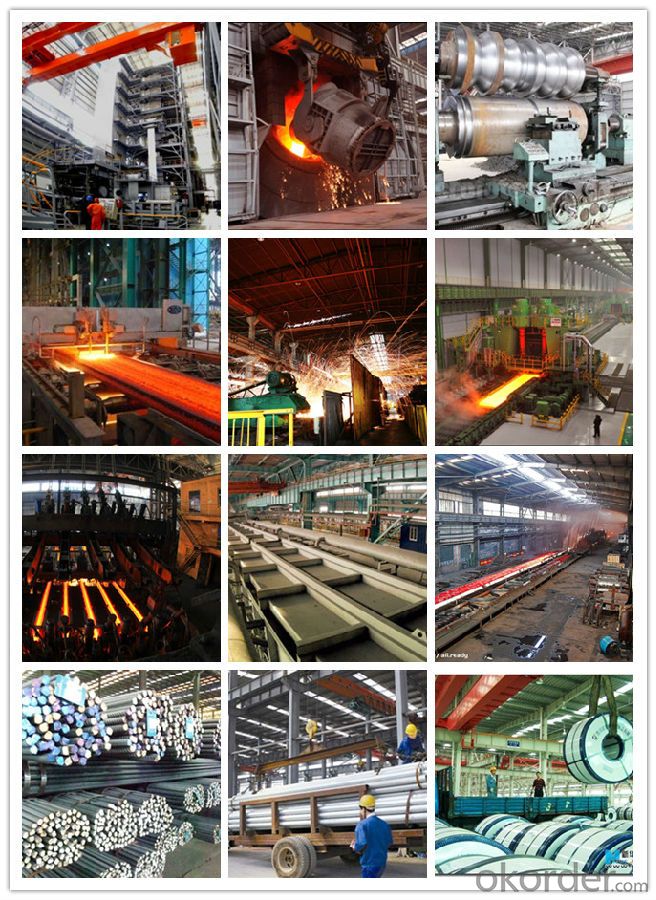
Shipping
1. FedEx/DHL/UPS/TNT for samples, Door-to-Door;
2. By Air or by Sea for batch goods, for FCL; Airport/ Port receiving;
3. Customers specifying freight forwarders or negotiable shipping methods!
Delivery Time: 3-7 days for samples; 5-25 days for batch goods.
Payment Terms
1.Payment: T/T, L/C, Western Union, MoneyGram,PayPal; 30% deposits; 70% balance before delivery.
2.MOQ: 1pcs
3.Warranty : 3 years
4.Package Informations: 1) EXPORT, In 20 feet (GW 25 ton) or 40 feet Container (GW 25 ton)
2)as customer's requirement
Why choose us?
(1) The leading exporter in China special steel industry.
(2) Large stocks for various sizes, fast delivery date.
(3) Good business relationship with China famous factories.
(4) More than 7 years steel exporting experience.
(5) Good after-sales service guarantee.
- Q: How is shock-resistant steel used in the production of impact tools?
- Shock-resistant steel is used in the production of impact tools because it has enhanced toughness and can withstand the high impact forces generated during use. This steel is specifically engineered to absorb and distribute the shock and vibrations produced when the tool strikes an object, reducing the risk of breakage and increasing the tool's overall lifespan.
- Q: What are the different pharmaceutical grades of special steel?
- There are several different pharmaceutical grades of special steel, including 316L, 904L, and 2205. These grades are chosen for their high corrosion resistance, excellent mechanical properties, and their ability to withstand harsh environments in pharmaceutical manufacturing processes.
- Q: How is spring steel used in the automotive industry?
- Spring steel is commonly used in the automotive industry for its ability to withstand high stress and maintain its shape. It is primarily used for manufacturing various suspension components such as springs, stabilizer bars, and torsion bars. These spring steel components provide stability, improve handling, and enhance overall vehicle performance and safety.
- Q: What are the different forms in which special steel is available?
- Special steel is available in various forms such as bars, sheets, plates, coils, tubes, pipes, and wires.
- Q: What are the different methods of surface carburizing for special steel?
- Surface carburizing is a heat treatment process used to increase the carbon content at the surface of steel, resulting in a hardened outer layer. There are several methods of surface carburizing for special steel, each with its own advantages and disadvantages. 1. Gas Carburizing: This method involves exposing the steel to a carbon-rich gas, such as methane or propane, at elevated temperatures. The gas reacts with the steel surface, depositing carbon and forming a hardened layer. Gas carburizing is a widely used method due to its versatility, controllability, and ability to produce uniform and deep case depths. However, it requires specialized equipment and longer processing times. 2. Pack Carburizing: In this method, the steel is packed in a container with a carbon-rich material, such as charcoal or carbon powder. The container is then heated to high temperatures, allowing carbon to diffuse into the steel surface. Pack carburizing is a cost-effective method, but it is relatively slower and less controllable compared to gas carburizing. 3. Liquid Carburizing: Also known as cyaniding, this method involves immersing the steel in a liquid bath containing a carbon-rich compound, such as sodium cyanide. The bath is heated to high temperatures, which enables carbon diffusion into the surface of the steel. Liquid carburizing is a fast and cost-effective method, but it requires careful handling of toxic chemicals and may result in lower case depths compared to other methods. 4. Plasma Carburizing: This method utilizes a plasma discharge to provide a carbon-rich atmosphere around the steel surface. The plasma contains hydrocarbons, which dissociate into carbon atoms that diffuse into the steel. Plasma carburizing offers precise control over case depth and can achieve high surface hardness. However, it requires specialized equipment and is generally more expensive than other methods. 5. Salt Bath Carburizing: In this method, the steel is immersed in a molten salt bath containing carbon-rich compounds. The salt bath is heated to high temperatures, allowing carbon to diffuse into the steel surface. Salt bath carburizing is a versatile method that can achieve high case depths and excellent surface hardness. However, it requires careful temperature control and can be challenging to remove the salt residues after the process. It is important to select the appropriate method of surface carburizing based on the specific requirements of the special steel, such as desired case depth, hardness, and cost considerations.
- Q: What are the requirements for special steel used in oil and gas equipment manufacturing?
- The requirements for special steel used in oil and gas equipment manufacturing are quite stringent due to the demanding operating conditions and harsh environments that these materials will be exposed to. Some of the key requirements include: 1. Corrosion Resistance: Special steel used in oil and gas equipment must have excellent resistance to corrosion, especially in the presence of various corrosive fluids such as oil, gas, and saltwater. This helps to prevent degradation and premature failure of the equipment. 2. High Strength: The steel must possess high strength and toughness to withstand the extreme pressures, temperatures, and mechanical stresses encountered in oil and gas operations. This ensures that the equipment can perform reliably under demanding conditions. 3. Heat Resistance: Oil and gas equipment often operates at elevated temperatures, especially in downstream processes such as refining and petrochemical applications. Special steel used in these applications must be able to maintain its mechanical properties and structural integrity even at high temperatures. 4. Weldability: Welding is a common joining technique used in the fabrication of oil and gas equipment. The special steel should have good weldability, allowing for efficient and reliable welding processes without compromising the overall strength and integrity of the equipment. 5. Fatigue Resistance: Oil and gas equipment is subjected to cyclic loading, which can lead to fatigue failure if the material is not properly designed to withstand these repetitive stresses. Special steel must possess good fatigue resistance properties to ensure long-term durability. 6. Low Temperature Properties: In certain applications, such as offshore drilling or arctic environments, the equipment may be exposed to extremely low temperatures. The special steel should exhibit excellent toughness and ductility at low temperatures to prevent brittle fracture. 7. Chemical Composition Control: The chemical composition of the special steel must be tightly controlled to ensure consistent and predictable material properties. This involves strict control over the levels of various alloying elements, impurities, and trace elements to meet the specific requirements of the oil and gas industry. Meeting these requirements is crucial for the safe and reliable operation of oil and gas equipment. Special steel manufacturers work closely with industry standards and specifications to develop and provide materials that meet these demanding requirements, ensuring the integrity and performance of the equipment in the oil and gas sector.
- Q: What are the requirements for special steel used in industrial equipment manufacturing?
- Special steel used in industrial equipment manufacturing typically has certain requirements to ensure its suitability for use in demanding applications. Some of the key requirements for special steel in this context include: 1. High strength: Industrial equipment often operates under heavy loads, so special steel must have excellent strength properties to withstand these forces. It should have a high yield strength, tensile strength, and hardness to prevent deformation or failure. 2. Corrosion resistance: Many industrial environments are prone to corrosion due to exposure to chemicals, moisture, or extreme temperature variations. Special steel used in such applications should have good corrosion resistance to prevent degradation and ensure long-term performance. 3. Wear resistance: Industrial equipment often experiences significant wear due to friction, abrasion, or impact. Therefore, special steel should have high wear resistance to maintain its integrity and prevent premature failure. 4. Toughness and impact resistance: Equipment used in industrial settings may face sudden shocks, impacts, or vibrations. Special steel should possess good toughness and impact resistance to absorb energy and resist fracture or cracking. 5. Heat resistance: In certain industrial processes, equipment may be exposed to high temperatures or rapid temperature changes. Special steel should have good heat resistance, with the ability to retain its strength, hardness, and other mechanical properties even at elevated temperatures. 6. Machinability: Special steel used in industrial equipment manufacturing should have good machinability to facilitate the fabrication process. It should allow for easy cutting, drilling, welding, and other machining operations without excessive tool wear or damage to the material. 7. Dimensional stability: Equipment components need to maintain their shape and dimensions under different operating conditions. Special steel should exhibit dimensional stability to prevent warping, distortion, or dimensional changes that could affect the performance or assembly of the equipment. Meeting these requirements ensures that special steel used in industrial equipment manufacturing can withstand the harsh conditions, provide reliable performance, and have a long service life, ultimately contributing to the overall efficiency and productivity of industrial processes.
- Q: How does special steel contribute to the aerospace noise reduction?
- Special steel contributes to aerospace noise reduction in several ways. Firstly, it is used in the construction of aircraft engine components such as fan blades and turbine discs. These components are subject to high temperatures and pressure, and special steel helps maintain their structural integrity, reducing vibration and noise. Secondly, special steel is also used in the manufacturing of aircraft fuselage and wings, where it helps dampen vibrations caused by aerodynamic forces, thus reducing noise. Additionally, special steel can be used in the production of sound-absorbing materials, which are used to line the interior of aircraft cabins, further reducing noise levels and improving passenger comfort. Overall, the use of special steel in various aerospace applications plays a crucial role in minimizing noise and improving the overall acoustic performance of aircraft.
- Q: How is wear-resistant steel used in mining equipment?
- Wear-resistant steel is commonly used in mining equipment due to its high durability and strength. It is utilized in various applications such as excavator buckets, crusher liners, and conveyor parts to withstand the harsh conditions of mining operations. The wear-resistant properties of this steel help to minimize abrasion and extend the equipment's lifespan, resulting in increased productivity and reduced maintenance costs.
- Q: How is high-strength tool steel used in the production of heavy-duty tools?
- High-strength tool steel is utilized in the production of heavy-duty tools due to its exceptional hardness, toughness, and wear resistance properties. This steel is specifically engineered to withstand high stress and extreme conditions, making it ideal for manufacturing tools that require durability and longevity. Heavy-duty tools such as drills, chisels, hammers, and cutting tools often require high-strength tool steel to ensure they can endure rigorous use and maintain their sharpness and functionality over time.
Send your message to us
Special Steel 1.2343 Round Forged Tool Steel
- Loading Port:
- China main port
- Payment Terms:
- TT OR LC
- Min Order Qty:
- 30 m.t.
- Supply Capability:
- 10000 m.t./month
OKorder Service Pledge
OKorder Financial Service
Similar products
Hot products
Hot Searches
Related keywords
